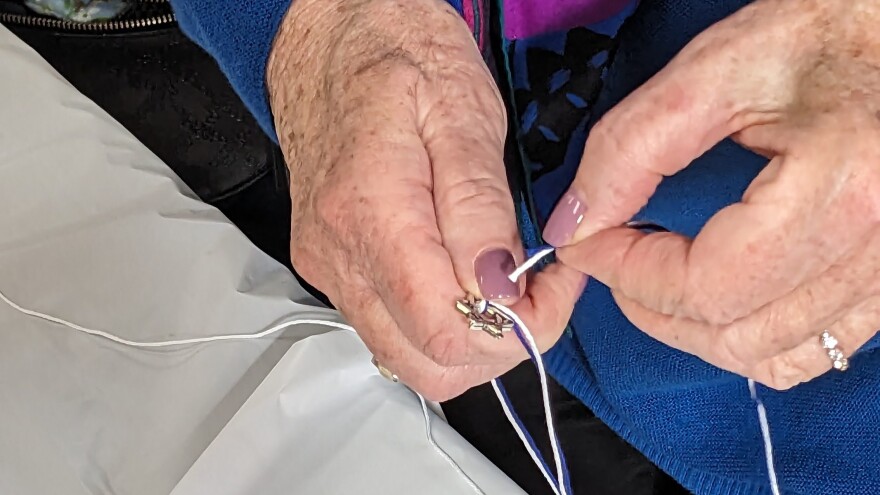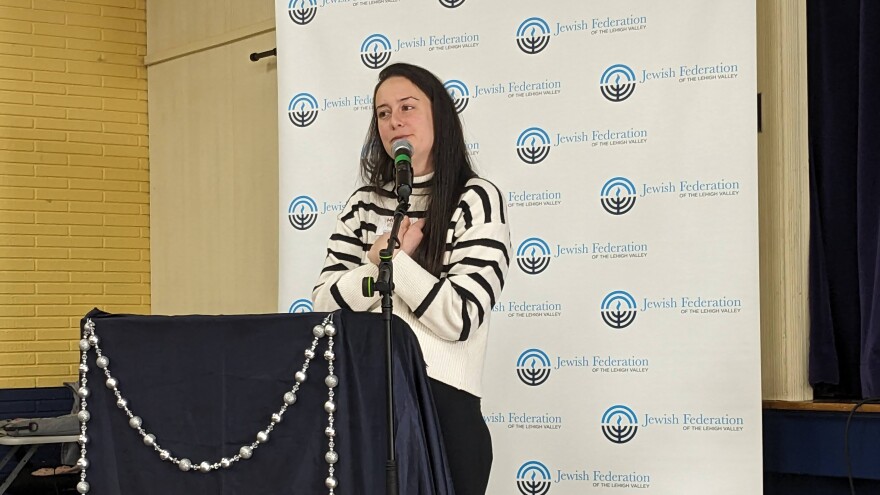- Dozens of volunteers gathered to make bracelets for a Jewish Federation of the Lehigh Valley Women’s Philanthropy fundraiser
- Money raised will go to assisting victims of the attacks, Israeli communities around Gaza, and IDF soldiers
- Former Lehigh Valley resident Meidan Keidar told about her own experience in Israel during the Oct. 7 attacks by Hamas
ALLENTOWN, Pa. – More than two dozen volunteers with the Jewish Federation of the Lehigh Valley gathered Sunday to raise money in support of Israel and hear first-hand accounts of the Oct. 7 attacks.
The federation’s Women's Philanthropy group is raising money for a campaign to support Israel. Funds collected are distributed among six organizations assisting victims of the attacks, Israeli communities around Gaza, and IDF soldiers.
“I'm trying to raise as much money as I can for Israel, where the soldiers are fighting a war for Jews everywhere,” said Laurie Wax, president of Women’s Philanthropy, who is leading the fundraising campaign. “We need to support any way that we can, because Israel needs to be there.”
Wax had the idea to sell bracelets through the federation in return for donations. But first, someone needed to make them.
After Meidan Keidar, a resident of Israel who formerly lived in the Lehigh Valley and was deeply involved in the area’s Jewish community, spoke about her experience of the Oct. 7 attacks by Hamas, everyone gathered around plastic tables arranged in rows at the back of the room.
After a quick lesson, they set to work tying blue and white string onto silver hearts and Stars of David.

‘We are next. They’re coming for us.’
Keidar first came to the Lehigh Valley in 2011 as a Shlichah, or emissary, for the Jewish Agency for Israel. For years, she visited just about every Jewish community group in the area.
“I just basically brought Israel to the valley,” she said. “I was there to bring Israel – to talk about my Israel. I'm not an ambassador, I'm not from the government. This is just to bring my life, my story and connect Jews and the diaspora to Israelis and Israel.”
She met her husband, Jeremy Vaida, during her time in the Lehigh Valley, and the pair moved to Israel a few years later to start a family.
On the morning of Oct. 7, Keidar recalled waking early with her children at her home in Haifa, about 100 miles north of Gaza near the Mediterranean coast. (Not long after waking up, she began to get news of the attacks.)
“Notification after notification after notification. This is Shabbat, it's 6:30 a.m. Why is there so much happening on my phone right now?”
First news of the attack came in a trickle, mostly from the news media. Only a couple of hours after the notifications began, Keidar recalled, she learned the country had declared war, an extremely rare move in Israel’s history.
“And what we were receiving is just basically what the media has been posting. And after a couple of hours, the government had declared a war,” she said.
“Now, we always have ‘operations.’ We always have rockets. We are used to them, it's part of life… and all of a sudden, they said ‘war.’ This never happened so fast. So fast we’re declaring a war, which means that something is happening and we don't know what it is.”
Through the haze, everyone eventually learned that Hamas militants had broken through the fortified Israeli border fence surrounding the territory to attack surrounding communities.
“Sometimes we have terrorists that do what they do and it's one, it's two, it's OK. We have five of them, [soldiers] will take control, it will be OK. And in the beginning, we really thought it was just dozens [of militants]. It was three thousand. Three thousand people coming through. You know, this is not the rockets that the Iron Dome can just smash in the sky and save us.”
The fortified safe room in Keidar’s apartment, like others across the country, is built to withstand rocket fire — but not a person trying to break in.
“The shelters are not even made to be against terrorists; they can just open the door from the outside. So that’s when you start – when you don't have a way, a thing, of how you even save yourself – is when you start being scared.”
She recounted learning of friends and colleagues killed in the attacks, and said she was grateful to be out of reach from Gaza.
However, in the days following the initial Hamas attack, Iran-aligned militia group Hezbollah began launching rockets toward Israel from Southern Lebanon, less than 30 miles from Keidar’s home in Haifa.
In one instance, Keidar recalled receiving notifications warning of enemy aircraft approaching from Lebanon. City by city, she watched the warnings approach Haifa.
When they heard the sirens sound, Keidar and her husband rushed their family to their fortified safe room.
“Our main concern was that we're next. And that feeling is something that I can't even explain.”Former Lehigh Valley resident Meidan Keidar
The warning was a false alarm; the family and their neighbors listened for falling bombs that never came. Local news reported that planes, rather than bombs, were actually dropping fighters for another slaughter.
“We are next. They're coming for us,” she recalls thinking. “And in that second, when I looked at Jeremy [Vaida] and our three kids that we had to wake up from bed and go into that room, we said that we can't stay here.
“Our main concern was that we're next. And that feeling is something that I can't even explain.”
The family decided they would return to their “second home:” the Lehigh Valley, where Vaida’s parents still live. She thanked the Jewish Federation, a sort of extended family itself, for helping her and her family since their arrival.
“Coming back to the community, it's like nothing changed,” she said. “We'll be OK. This too shall pass.”


